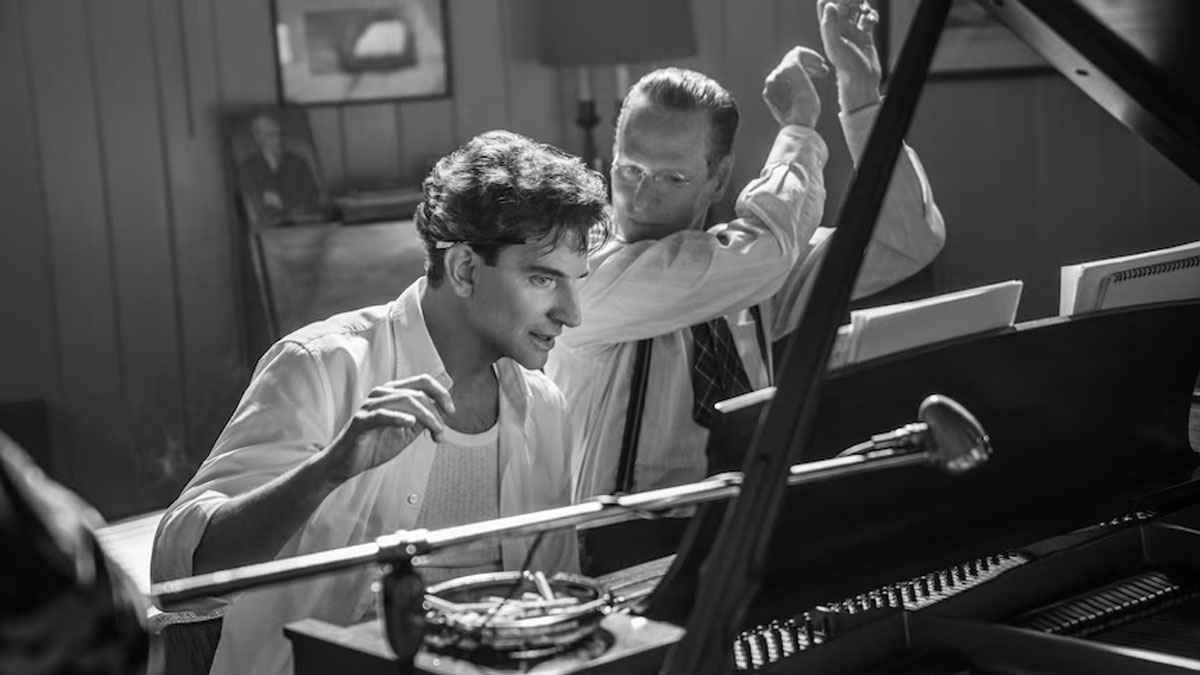
No one could accuse Bradley Cooper of lacking big-screen ambition.
After starring in and directing the smash remake of A Star is Born, the actor-turned-filmmaker returns with Maestro, a swooning biopic of the legendary American composer Leonard Bernstein that — at its best — reaches the ecstatic heights of the conductor's symphonies.
Cooper sets the bar high with an opening quote from Bernstein, one that cannily doubles as a built-in defence against the film's critics:
"A work of art does not answer questions, it provokes them; and its essential meaning is in the tension between the contradictory answers."
It also sets the stage for a heady plunge into the life of a remarkable, multifaceted American figure.

Charismatic and larger than life, Bernstein was a 20th century musical giant whose career of composing and conducting for orchestra and film scores saw him achieve a kind of global cultural ubiquity. (His inspirational Young People's Concerts were broadcast on national TV and syndicated in some 40 countries around the world, from the 1950s through the 1970s.)
He was also a gay man in an era where the closet was the preferred mode for public figures — a fact testified to by his 27-year marriage to a woman, which forms the focal point of Cooper's film.
Maestro begins in time-honoured music biopic style, with the older Bernstein (also played by Cooper) taking a moment to think about his entire life. Moments later, the film careens back in time to a black-and-white 1943, where the young conductor has just received his breakthrough call to head up the New York Philharmonic at Carnegie Hall.
In the ensuing rush of stardom he falls — platonically, at least — for Felicia Montealegre (Carey Mulligan, wielding a mid-Atlantic accent), a rising stage actor who clocks precisely what she's getting herself into.
"I know exactly who you are," Felicia tells Lenny. "Let's give it a whirl."
Though Felicia is accommodating of her husband's extramarital affairs, their life of willing deception will eventually take its toll. It's this domestic tension that drives Cooper and co-writer Josh Singer's screenplay, which endeavours to build a private, rather than our more familiar public, sense of its subject.
Inhabiting almost 50 years of Bernstein's life, Cooper delivers a rich, immersive performance, transforming himself both physically — makeup designer Kazu Hiro's work goes far beyond that much-publicised proboscis — and technically, lowering his voice to reflect the conductor's melodically nasal, four-pack-a-day timbre.
There's considerable craft to his creation, born of an obvious passion. The star spent some six years developing the project and learning how to conduct an orchestra, and even directed the movie while remaining in character as Bernstein. (For those of you playing at home, the Best Actor Oscar seems to be pretty much his to lose at this point.)
Cooper is a warm, generous actor; it shines through in his portrayal of a man who was bursting with vitality, who was eager to please everyone around him — even when it came at the expense of loving himself.

Together, their show-stopping moment arrives in an explosive argument set against a Thanksgiving Parade, which Cooper lets unfurl in a long take that practically screams Oscar clip — that is until he deflates it all with a droll sight gag, one of the best of the year.
It's evidence of Cooper's growing confidence and craft as a filmmaker, which was already on display in his debut. He favours long, dramatic push-ins and off-kilter framing that he might have gleaned from his Licorice Pizza director Paul Thomas Anderson, and designs seamless camera moves that seem to glide across space and time.
A bravura early sequence, shot with smoky Old Hollywood glamour by cinematographer Matthew Libatique, reimagines Bernstein's 1944 ballet Fancy Free as a dance between Felicia and Lenny intertwined with homoerotic sailors.
As you might expect, the score — supplied by the London Symphony Orchestra — enriches these and other moments, giving Maestro the sustained feel of a musical movement. Variations on classical pieces by Schumann, Mahler and Beethoven mix with nods to Bernstein's own compositions from On the Town and West Side Story, adding grandiose flourishes to the story.
It all reaches a crescendo in a miraculous sequence set inside England's Ely Cathedral in 1973, with Bernstein — and Cooper — leading the orchestra through Mahler's Resurrection Symphony and into sweaty, spiritual abandon. Those prosthetics really get a workout.
Maestro is available in cinemas and on Netflix.
Stay tuned for the latest news on our radio stations

